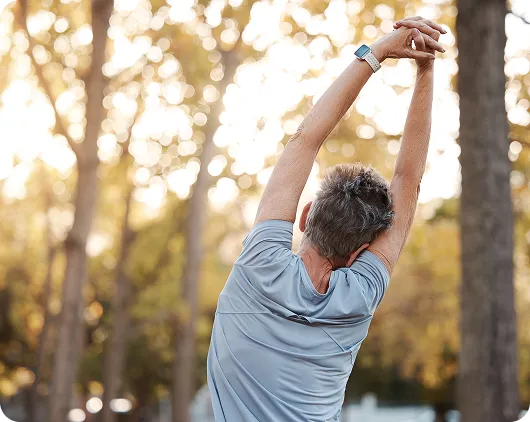
Why Lifestyle Habits Matter in Pain Management
At Spinal Diagnostics, we believe that effective pain management goes beyond procedures and medications. By making thoughtful adjustments to your daily routine, you can significantly reduce symptoms and improve your overall well-being.
Lifestyle changes are a powerful tool when combined with other treatments like injections, non-opioid medications, or alternative therapies.
Why Lifestyle Habits Matter in Pain Management
At Spinal Diagnostics, we believe that effective pain management goes beyond procedures and medications. By making thoughtful adjustments to your daily routine, you can significantly reduce symptoms and improve your overall well-being.
Lifestyle changes are a powerful tool when combined with other treatments like injections, non-opioid medications, or alternative therapies.

Managing Back and Neck Pain
Certain lifestyle habits can help ease pain and prevent flare-ups in the spine and neck:
✔ Maintain Good Posture: Keeping your spine aligned with relaxed shoulders helps reduce strain. Our physical therapists can guide you with posture tips and strengthening exercises for your core and back.
✔ Use Ergonomic Seating: Choose chairs that support your spine’s natural curve. Add lumbar or neck cushions, and take breaks to stretch and walk throughout the day.
✔ Manage Stress: Stress can intensify chronic pain. Practice mindfulness, deep breathing, yoga, or activities you enjoy to promote relaxation and reduce tension.
✔ Prioritize Sleep: Use a high-quality mattress and pillows that support spinal alignment. Maintain a regular sleep routine and create a calming environment to improve sleep quality.
Managing Pelvic Pain
These lifestyle changes can help reduce the symptoms of pelvic pain:
Pelvic Floor Exercises
Kegels and other exercises strengthen pelvic muscles and support bladder control, sexual function, and pain reduction. Work with a specialist for proper technique.
Ergonomic Adjustments
Use chairs with lumbar and pelvic support. Avoid sitting or standing too long without breaks.
Heat and Cold Therapy
Try heating pads or warm baths to ease muscle tension, or cold packs to reduce inflammation.
Anti-Inflammatory Diet
Eat leafy greens, berries, salmon, and drink water. Avoid caffeine, alcohol, and processed foods that may worsen inflammation.
Stress Management
Chronic pain is often tied to emotional health. Meditation, breathing techniques, or relaxing hobbies can lower stress and help with symptom control.
Managing Back and Neck Pain
Certain lifestyle habits can help ease pain and prevent flare-ups in the spine and neck:
✔ Maintain Good Posture: Keeping your spine aligned with relaxed shoulders helps reduce strain. Our physical therapists can guide you with posture tips and strengthening exercises for your core and back.
✔ Use Ergonomic Seating: Choose chairs that support your spine’s natural curve. Add lumbar or neck cushions, and take breaks to stretch and walk throughout the day.
✔ Manage Stress: Stress can intensify chronic pain. Practice mindfulness, deep breathing, yoga, or activities you enjoy to promote relaxation and reduce tension.
✔ Prioritize Sleep: Use a high-quality mattress and pillows that support spinal alignment. Maintain a regular sleep routine and create a calming environment to improve sleep quality.

Why Lifestyle Changes Matter
Incorporating positive habits—such as better posture, stress management, and supportive nutrition—can help reduce pain from back and neck issues, pelvic disorders, and neuropathy. These strategies work best when paired with your broader treatment plan.
Small steps can make a big difference.
A tailored approach keeps you in control.
We’re here to help you build a plan that works.
Why Lifestyle Changes Matter
Incorporating positive habits—such as better posture, stress management, and supportive nutrition—can help reduce pain from back and neck issues, pelvic disorders, and neuropathy. These strategies work best when paired with your broader treatment plan.
Small steps can make a big difference.
A tailored approach keeps you in control.
We’re here to help you build a plan that works.

Why Choose Spinal Diagnostics?
Patients choose Spinal Diagnostics for our comprehensive approach, accurate diagnostics, and compassionate care. We stay at the forefront of interventional procedures and are committed to improving your quality of life without opioids or invasive surgeries.
Proven Medical Expertise
We bring years of clinical experience in pain management and interventional procedures.
Constant Innovation
We use the latest techniques and technology to ensure safe, effective treatment.
Compassionate Care
We listen, understand, and treat every patient with empathy and respect.
Personalized Plans
Each treatment is tailored to your condition, goals, and lifestyle.
Discover what's behind your pain.
Explore the conditions we treat and find the answers you’ve been looking for.
Discover what's behind your pain.
Explore the conditions we treat and find the answers you’ve been looking for.


